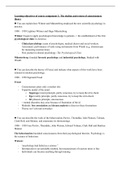On 27 December 2023 Amazon was fined €32m (£27m) for practising excessive surveillance
on its workers in France, a practice that data and privacy regulators in the country deemed
unlawful. Mayne (2024) explains that the monitoring practices implemented by the company
like the use of cameras, scanners and worker tracking infringed on workers’ rights and GDPR
standards. National Commission on Informatics and Liberty (CNIL), a regulatory body in
France that advocates for data privacy, penalized the global giant Amazon for what it said
was illegal and excessive monitoring. This fine demonstrates the need for multi-national
companies to ensure that they follow the privacy laws of the nation they operate in.
The core issue in this individual report is between Amazon seeking efficient operation and
employees’ privacy. Technical measures designed to address theft, privacy, control inventory,
and enhance productivity consequently created discontent from employees that led to legal
complaints and investigations (Brand, 2024). Subsequently, this case has ramifications for
Amazon’s employees, Amazon and its future functioning, and CNIL and other regulatory
authorities meant to protect privacy of workers. This report will examine the case of
excessive surveillance in Amazon French warehouse as a source of conflict between Amazon
and its employees, the theoretical underpinnings of the case, and recommend measures that
might prevent the reoccurrence of the conflict.
Theory-Based Critical Analysis of the Causes of the Conflict
Causes of the Conflict
Central to the employment relations case in this report is the need for balance between the
privacy of employees and a company’s performance. Indeed, the firm largely believes in its
business objectives and goals as the primary drivers of performance and expects the
employees to align with those goals (Mayne, 2024). When used in this context unitarism
means that Amazon perceives its monitoring practices as appropriate in efforts to minimize
, 2
theft and promote safety and efficiency. However, this approach overlooks any variation and
diverse opinions between workers, who view these measures as a violation of their privacy.
On the other hand, there are always conflicts of interest between workers and the
management. This is because employees may not believe in the same goals as the company.
Employees, especially the lowly ranked workers at the Amazon warehouses appreciate
autonomy and privacy. From a pluralist perspective, surveillance systems are implemented by
the management to maintain high levels of control to their employees who in return, do not
perceive such surveillance systems as supportive, but rather as interference of their privacy
(Van, 2022). Based on the pluralist perspective, the approach by Amazon has never paid
attention to the paramount needs of its employees.
Amazon’s Perspective
Amazon’s surveillance practices are largely rooted in two primary objectives: improving the
efficiency of their work and enhancing safety. For Amazon that is entirely dependent on a
lean and efficient operational network, monitoring its employees makes it easy for the
management to notice weaknesses and identify security threats. This approach is consistent
with scientific management theory in that it seeks to enhance efficiency through stringent
managerial approaches (Bell and Martin, 2012). By investing in such kind of practices such
as use of camera and workers’ tracking, Amazon is able to optimize and maximize
productivity in a time-sensitive economic environment.
The company also claims that surveillance is a significant aspect in promoting the firm’s
protection. Since the warehouses contain expensive items then chances of theft occur, hence
surveillance is viewed as a way of discouraging such acts. For Amazon, surveillance is not
disciplinary, but protective, meeting the needs of the company and employees by keeping the
workplace environment safe.




